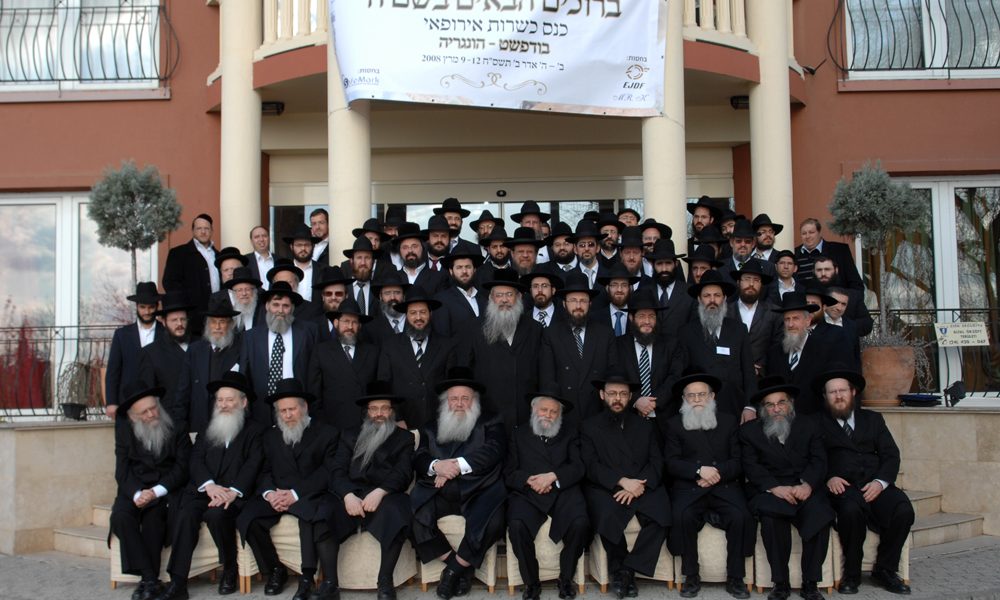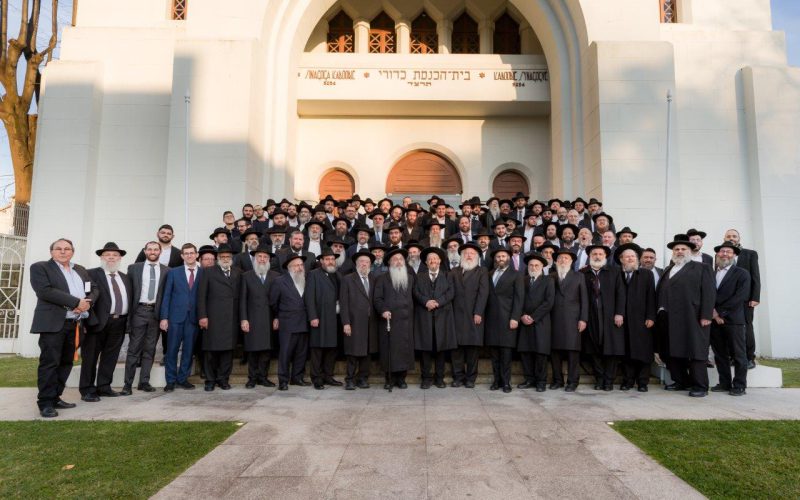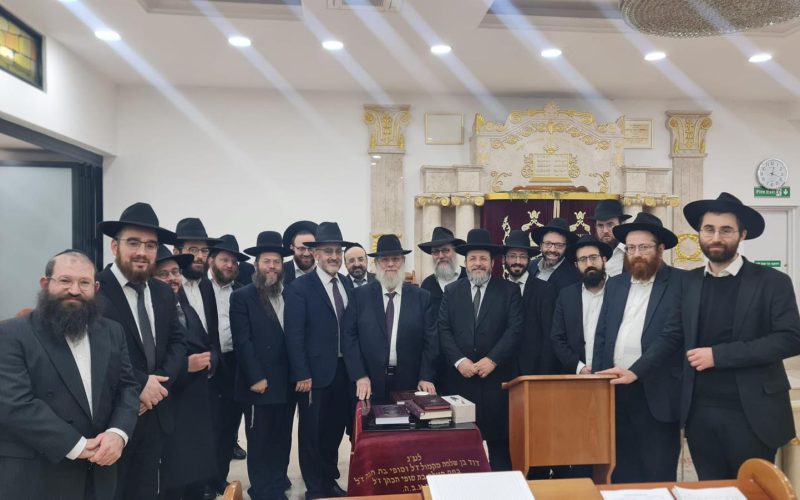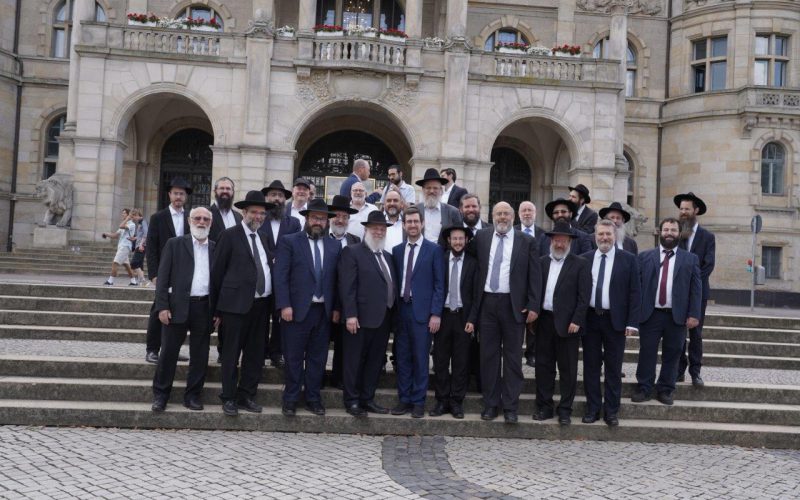Kashrus Conference Attended By Hundred Rabbis from All Over The World

About one hundred Rabbis representing a range of communities all over the Jewish world gathered for a special Kashrus conference which took place last week in Hungary, arranged by the Rabbinical Centre of Europe. The conference was spread over three days, packed with lectures, discussions and symposiums, in the picturesque town of Rֳ¡ckeve on the borders of the Danube River,
Rabbis from many countries participated in the international Kashrus Conference initiated by the RCE. It is well-known that the food industry is typically dynamic and does not stand still, which automatically provides challenges for the Rabbis and Kashrus networks. In the light of recent developments, decisions are required on many halachic topics, and consequently the Rabbis have gathered for a few days of discussions encompassing Kashrus topics from all angles.
The necessity for such a conference has been felt for some time, and the RCE has decided to take the plunge. Many queries have found their way to the Centre’s Rabbis which have accentuated the need for a conference devoted only to Kashrus topics. As a result, almost one hundred Rabbis found themselves seated side by side, while the location of the conference – a small town near Budapest, capital of Hungary – was chosen due to the invitation of the Budapest Rabbis, seeking to strengthen the local Jewish community which has recently begun to flourish.
The conference was opened by Rabbi Menachem Margolin, Secretary General of the Centre, who spoke of the need for this conference, and invited Rabbi Saadia Amor, Head of Sephardic communities Beis Din (Jewish Court) in London, to lead the public recitation of Tehillim.
Rabbi Gershon Mendel Garelik, Head of Beis Din in Milan, and founding member of the RCE, said that this conference gives him the energy to continue his activities of behalf of the Centre,
Rabbi Pinchas Leibush Padwa, Head of the RCE Kashrus Dept., and Rabbi of Eitz Chaim Shul in Amsterdam, Holland, discussed the progress which characterises the food industry, and declared that every Rabbi must be an expert in all Kashrus matters, and should inform his congregants of any new developments in Kashrus.
“I have the honour of heading the Kashrus Dept. of the Rabbinical Centre of Europe, to which kashrus queries stream every day from all corners of the world. There is no doubt that this conference will be of great assistance to all the Rabbis participating”, Rabbi Padwa said.
Rabbi Moshe Tuvia Weissberger, Rabbi of Adass Yereim, Budapest, and a member of the European Rabbisֲ´ Committee, delivered a deep halachic discussion on the subject of gelatine, which was accompanied by lively halachic arguments in the Conference Hall. Rabbi Weissberger ended his lecture with laws of the upcoming festival of Purim.
Rabbi Boruch Oberlander, born and bred in Budapest, now Rabbi of Chevras Shass Cong, Budapest, and member of the European Rabbisֲ´ Committee, delivered a deep and fascinating lecture on the subject of Matzo baking according to various customs in different communities, and the resulting halachic differences.
The session where Rabbi Y. Efrati and Rabbi A. Rubin participated was opened by Rabbi Michoel Schmerla, Rabbi of Strasbourg and member of European Rabbisֲ´ Committee, who thanked the organisers and spoke of the importance of this gathering.
Rabbi Y. Efrati, Head of the Beit Hamedrash for Laws Concerning Agricultural Settlements, had arrived from
Rabbi A. Rubin, Head of the Mehadrin Kashrus network, brought under discussion several halachic topics, and concentrated on the importance of keeping up with the technological progress in the food industry. He also emphasised that it is impossible for a Rabbi to certify a product unless he is up to date with every detail of the technological developments, and unless the certifying Rabbi and the Mashgiach (Kashrus supervisor) are constantly in direct contact with the factory.
Can one rely on the codes and lists of ingredients which appear on the products?
This question was raised by Rabbi Yosef David Frankfurter, Rabbi of Adas Yereim and Igud Chareidim in Paris, who concentrated on the transparency which the authorities demand from the factories and how much one can rely on it, if at all.
Rabbi Levi Yitzchok Garelik, Head of the European Academy of Advanced Studies for Torah and Halacha, surprised the audience with a new concept – a computerised system which keeps track constantly of all ingredients of the food industry. In this way one can trace precisely which ingredients are used in each factory.
Rabbi Moshe Nachshoni, who has many years experience in Kashrus, discussed the subject of kosherising hotels owned by non-Jews, and of heating products with double wrapping. He mentioned the halachic decision of Rabbi Shmuel Wosner.
Rabbi Aharon Chaskel, Head of OK Kashrus network in Israel, delivered a fascinating speech on the certification of food ingredients produced in China. His speech was accompanied by a slide show.
A very interesting lecture on the topic of Tevilas Keilim (ritual immersion of food utensils) was delivered by Rabbi Tzvi Cohen, author of several well-known books on halachic topics, who stressed many important laws on this subject which are not generally known.
During the lectures there were many lively discussions between the participants, who asked many questions on the subjects, quoting the opinions of our great leaders for and against the speakerֲ´ s view.
The Kashrus network of Rabbi Moshe Yehudah Leib Landau, Rabbi of Bnei Brak, was represented by Rabbi Bezalel Schutz, who delved into the topic of flavours, and Rabbi Leibush Weiss who examined the subject of constant supervision in slaughterhouses, both for Pesach and throughout the year, emphasising important aspects of which one must be aware concerning supervision of a slaughterhouse. His words aroused great interest and overwhelming response.
Rabbi Yisroel Moshe Friedman, Shechita supervisor of the Belzer Beis Din, Machzikei Hadass, mentioned the specific points which his Kashrus network observes in the slaughter of chickens; in contrast to the common view, these are not stringencies but adherence to the explicit laws of the Shulchan Aruch. Rabbi Yitzchok Arzi, Manager of the Import Dept. of the Israeli Rabbinate, enraptured the audience by describing the supervision of the Rabbinate on products imported from abroad.
The highlight of the conference was the Gala Dinner held in a magnificent palace in the vicinity. Rabbi Avraham Yafe-Schlesinger, Rabbi of Machzikei Hadass in
“We see the fruits of your activities throughout the year,” declared Rabbi Yafe-Schlesinger, quoting as a concrete example a query which he had received just two hours previously from an outlying community in
A representative of the Hungarian Ministry of Education thanked the Rabbis for choosing to arrange their conference in Hungary, and promised continued assistance to the local communities.
The conference ended on its third day with a trip to Slovakia where the Rabbis visited the gravesites of the revered Chasam Sofer and his son, the Kesav Sofer, and prayed for the welfare of all world Jewry. On the way Rabbi Moshe Nachshoni elaborated on the life of the Chasam Sofer and the holy communities and Yeshivas which had existed in Slovakia.
The Rabbis thanked the leaders of the organisation for this important conference which gave them much food for thought.


